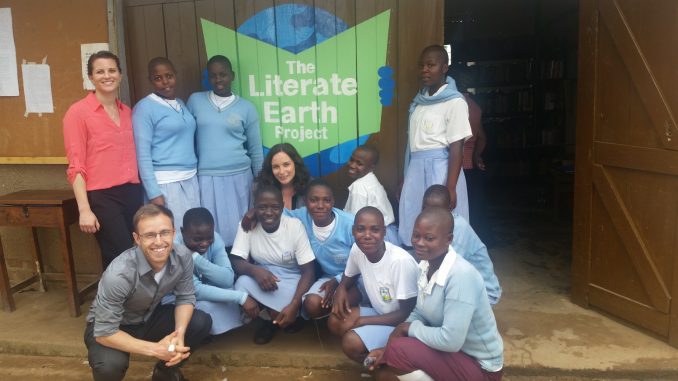
During a service trip Jeff Fonda took to Uganda, he worked in a school with no textbooks. Instead, every student was given a hand-written version of a textbook for their classes.
“It’s a crazy process, they actually hand copied each book over and over again,” Fonda said. “It was great they had the text, but they had no formalized pictures or graphs.”
Fonda, a first-year master’s of business administration student, was inspired by his experiences in Uganda to found the nonprofit called The Literate Earth Project, an organization that helps Ugandan children get access to books and increase literacy.
Other than the hand-copied textbooks, students had no books to read for pleasure. Fonda soon discovered the school’s headmaster had approximately 15 books in his office and decided to show them to the students.
“With these books and atlas, they were seeing pictures of new people, trees, buildings, things they had never seen before,” Fonda said.
Information about sports in particular were of interest to them, Fonda added.
“They were asking things like, ‘What is this sport?’ They had never seen tennis before. ‘What is this racket for?’” he said.
This is when his revelation occurred, he said.
“You could see the wheels were going in their heads,” Fonda said. “That experience of seeing the real need for knowledge and how it spurred these other thoughts and conversations was amazing.”
The Literate Earth Project was officially formed in 2011. In 2013, Fonda and his organization opened their first library in Uganda. In that same year, they also received a LEAP grant from BetterWorldBooks. LEAP grants are given to organizations with “game-changing” ideas to “help advance a compelling literacy project,” according to its website.
“We watched [the first library] for a year and half to see it’s successes and failures,” he said.
After Fonda and other individuals from the organization saw the library was working, they began to open more libraries throughout the country in 2014.
In the past two and a half years, The Literate Earth Project has opened nine libraries in areas like the Rakai, Masaka and Wakiso districts of Uganda. The organization will also open two more this year.
“As long as we are able to keep up funding, we’re actually on pace to open four to six libraries per year and we would like to continue at that pace,” said Alex Moore, project’s chief operating officer.
The need for books in Uganda is evident through the requests for the organization’s libraries. The Literate Earth Project has a list of about 50 schools that have been okayed to receive libraries, but hundreds have made requests.
To ensure success, the organization has a vetting process where staff visit the school to assess its needs. They make sure the teachers and community are going to get involved, and that the books will actually be used by the students.
In the past, to raise awareness for the program, Fonda has met with Uganda’s Vice President, H. E. Edward Ssekandi. Ssekandi has implemented policy to aid in increasing literacy in Uganda.
Fonda said he hopes to expand the program to the many schools on their waitlist, but the organization doesn’t have money for the books themselves. By applying for grants, starting college clubs and hosting events like the Let’s Get Literate 5K Run, they have started to raise more money for their efforts.
“We’re constantly looking for new partnerships so that we can kind of work together with other organizations that might provide solar energy or computers to schools,” Moore said.
Fonda, who is interested in eventually starting a club on Main Campus connected to his nonprofit, hopes to continue focusing on Uganda due to the serious demand for libraries.
“I’d like to say we can change the whole world, but right now our goal is to change Uganda,” Fonda said. “The demand is insatiable [there].”
Kimberly Burton can be reached at kimberly.burton@temple.edu.


Be the first to comment